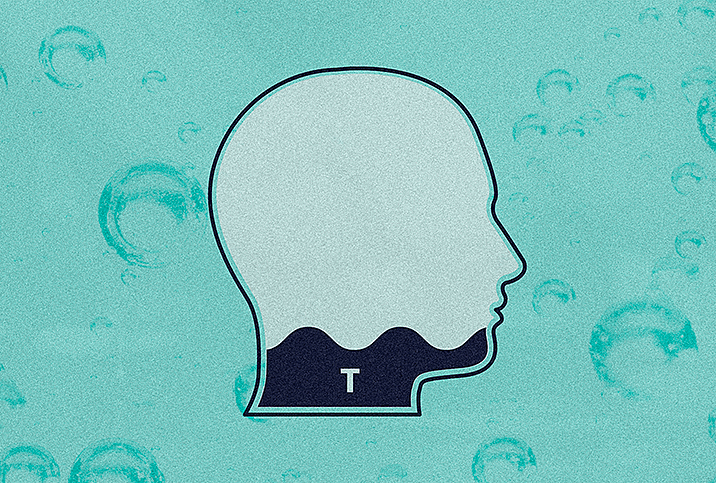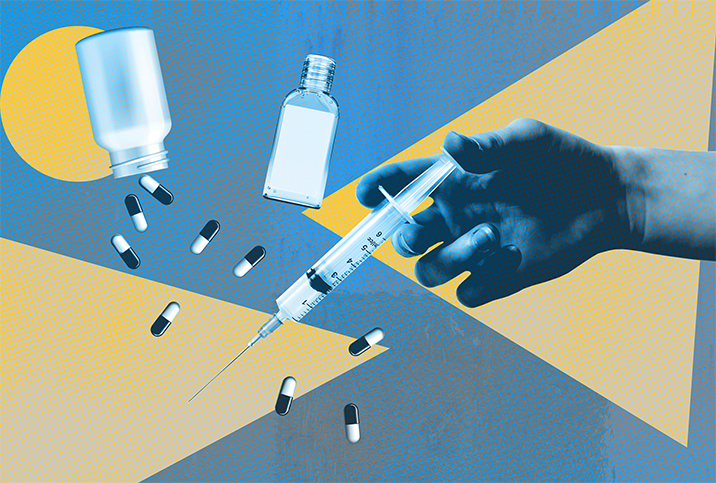Low-T: Myths & Misconceptions

Low testosterone, or low-T, is a condition where the testes do not produce enough of the hormone testosterone. Also known as hypogonadism, low-T affects about 2 percent of all men, though estimates from different studies vary widely.
Testosterone is a sex-related hormone that plays a significant role in male physiology. This hormone is responsible for the development of many male physical features, such as muscle development and strength, bone mass, a deep voice, genitalia, facial hair (and sometimes baldness), fertility, sex drive/libido and the production of sperm and semen. Testosterone is also responsible for the distribution of fat and the production of red blood cells.
People talk a lot about this crucial hormone. Some of what they say is true, some of it’s false. Let’s separate the facts from fiction.
Myth: Only male bodies make and need testosterone.
Reality: The truth is testosterone is but one among a few other "male" sex hormones called androgens that are also made in female bodies. So even women are at risk of having low testosterone. In the female body, testosterone is responsible for regulating the ovaries’ functions, bone development and strength, and driving a woman’s sexual desire.
Myth: Testosterone is produced only in the testicles.
Reality: While testosterone is produced in the testicles, it is also produced in the adrenal glands and, in women, in the ovaries. Any damage to these organs could result in a low-T diagnosis. The organs that produce testosterone synthesize the hormone from cholesterol that is already in the body. The pituitary gland, located in the brain, is responsible for the overall amount of testosterone produced by the body.
Myth: Low testosterone is unavoidable as I age.
Reality: Even though testosterone production naturally decreases as most men get older, there are normal levels and also unacceptable declines. In some men, testosterone may drop to an unhealthy level regardless of their age. Very low levels may lead to such symptoms as increased fatigue, reduced sexual interest, decreased muscle mass, reduced tolerance for exercise, erectile dysfunction, memory loss, decreased cognitive function and even depression. It’s important that your physician evaluate your symptoms and order blood tests to check various hormone levels. If you receive a low-T diagnosis, your physician may treat you with testosterone replacement therapy. The options for this include creams, patches, gels, pellets implanted under the skin and injections.
If you’d prefer to avoid TRT or if your testosterone is just beginning to drop, supplementation can help. Libido Boost vitamins provide a steady stream of nutrients to keep your testosterone at appropriate levels. These Giddy Health supplements use only key ingredients that have been shown to help reduce stress and boost testosterone production. Filled with ashwagandha, longjack and zinc, Libido Boost capsules use microbead technology for a timed release throughout the day.
Myth: Testosterone replacement therapy will increase my sperm count.
Reality: The medication will likely decrease your sperm count. On the positive side, though, testosterone replacement therapy may help boost your mood, energy and libido. It can also help increase muscle strength and bone density, but don’t expect to feel like a new man immediately. It will take a long time just to feel normal, maybe as long as three to six months.
Myth: Testosterone replacement therapy can increase my risk of heart disease and cancer.
Reality: This myth appeared thanks to an early study that suggested testosterone replacement therapy increases a man’s risk of a heart attack. However, the latest research shows testosterone replacement actually decreases cardiovascular disease. Concerns about the therapy leading to a cancer diagnosis are also unfounded. While testosterone replacement therapy is controversial for patients who are also diagnosed with prostate cancer, the data shows that the medication does not cause prostate cancer.
Myth: It’s safe to buy testosterone supplements online.
Reality: Actually, it’s not. Period. Testosterone medications are controlled substances that can only be prescribed by a physician. Using testosterone supplements without medical supervision is risky. Too risky. Using testosterone in excessive amounts may lead to unwanted breast enlargement and cause your body to stop producing its own testosterone. It may also increase the risk of blood clots and stroke.
Testosterone is a critical hormone that affects almost all functions of the body. It is important to get an appropriate diagnosis from a urologist or an endocrinologist if you have symptoms or suspect you may have low-T.


















